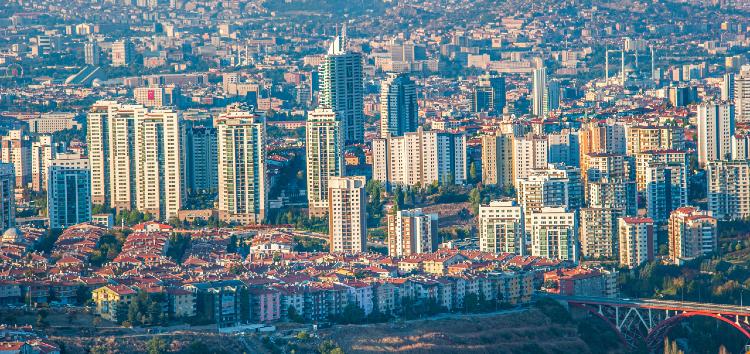- EBRD loan to support metro line in Türkiye’s capital
- Dikimevi-Natoyolu metro line to make city’s transport greener
- Project to increase women’s mobility in underprivileged district
The European Bank for Reconstruction and Development (EBRD) is providing a loan of €125 million to Türkiye’s Ankara Metropolitan Municipality to finance the construction of the city’s Dikimevi-Natoyolu metro line as part of a €250 million co-financing package with the Agence Française de Développement (AFD).
Ankara, the country’s capital, is Türkiye’s second-largest city. It has a population of 5.7 million and official projections indicate that Ankara will have 6.3 million inhabitants by 2025. The city has an integrated network of railways, metro lines, buses and cable cars, in addition to privately owned bus lines – all of which remain under pressure due to the rapid growth in population.
The construction of the metro line will improve connectivity in the city. It will also allow a significant reduction in carbon emissions by encouraging greater use of public transport and shifting transport to a low-emission metro option. Once the construction has been completed, the project aims to reduce air pollution by 75 per cent and to bring an estimated average reduction of 18,169 tonnes of carbon dioxide equivalent per year.
The project is financed under the EBRD Green Cities programme and addresses some of the key environmental challenges of climate mitigation and air pollution identified in Ankara’s Green City Action Plan. Ankara is one of the most densely populated cities in Türkiye and has been part of the Green Cities programme since in 2021.
In addition, the project will increase mobility in Mamak, one of the city’s underprivileged districts, where overcrowded transport remains a challenge, particularly for women with young children. The new metro line will offer women faster, safer and more accessible trips at a lower cost, increasing their active participation in daily life.
Sue Barrett, EBRD Director for Infrastructure in Türkiye, the Middle East and Africa, welcomed the transaction, saying: “Cities are where most pollution and emissions occur and greener investment in urban mobility is urgently needed across the EBRD regions to make them better places to live and work. We are proud to be partnering with Ankara Metropolitan Municipality on this high-impact project and are confident that it will allow the residents of Ankara to imagine a healthier, cleaner future by significantly reducing the city’s carbon emissions. We will continue to support sustainable infrastructure projects in Türkiye that contribute to the country’s net-zero journey.”
Sule Kilic, EBRD Deputy Head, Türkiye, said: “Ankara plays an integral role in the prevailing municipal culture in the country. This significant transaction will serve as a catalyst to promote a more sustainable way of living in the city. By increasing greener mobility in Ankara, we hope to shine a light on the role that transport plays in decarbonisation and encourage all other local administrations to follow Ankara’s example.”
Mansur Yavas, Mayor of Ankara, spoke during the signing, commenting: “We came together today for the loan agreement of the Mamak extension, together with the EBRD and AFD. Let this bring good fortune to Ankara.”
Mathilde Grammont, Chargé d’Affaires to the French Embassy in Ankara, said: “France is proud to accompany AFD in the financing of the Ankara light metro-extension project, which will benefit the population while meeting the challenges of combating the effects of climate change.”
To date, the EBRD has invested more than €18 billion in various sectors of the Turkish economy, largely in the private sector.




